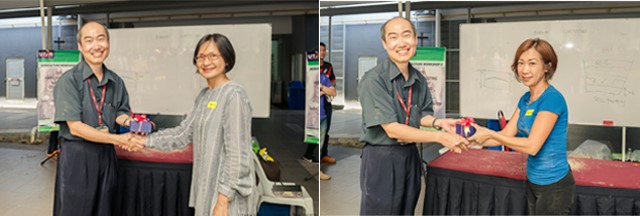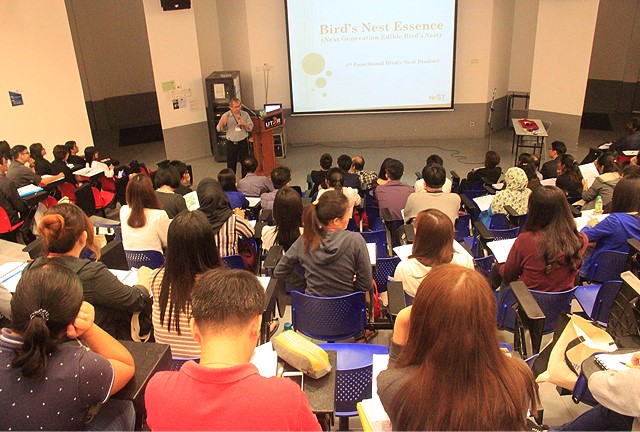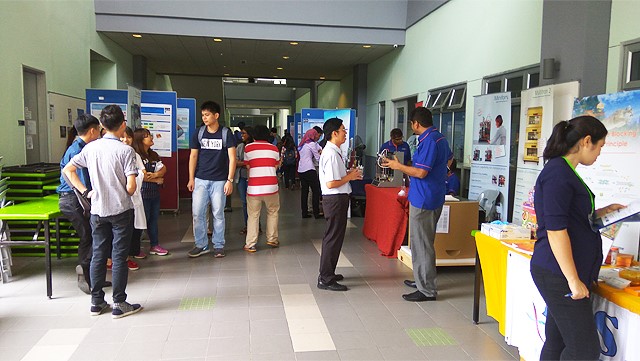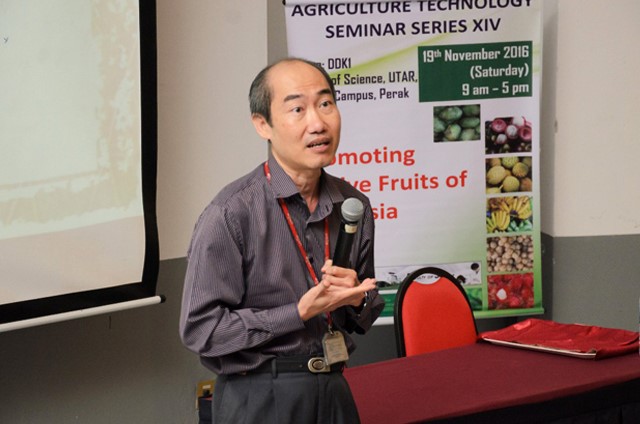Centre for Biodiversity Research
| Agriculture Technology Seminar Series XIII |
|---|
| 16th July 2016, Block D, Universiti Tunku Abdul Rahman (UTAR),
Kampar Campus
Speakers, organisers and
participants posing at the end of the seminar Following the past 12 successful seminars that highlighted the advances of agriculture and food science, this year’s Agriculture Technology Seminar Series XIII recommenced with the aquaculture industry being the cynosure of the seminar. Themed ‘Towards Environmentally Sustainable Aquaculture’, the seminar was co-organised by UTAR’s Centre for Biodiversity Research (CBR), Faculty of Science (FSc) and Institute of Postgraduate Studies and Research (IPSR) on 16 July 2016 at the Kampar Campus. Attracting the largest crowd among the previous
seminars, UTAR Vice President for R&D and Commercialisation Prof Ir Dr Lee
Sze Wei thanked the 160 participants for their support and participation
that has enabled the seminar to grow from strength to strength over the
years. “As the seminar is the university’s responsibility and
initiative in agricultural science, I believe the seminar has received a
good reputation and following from the general public and industrial
experts. I hope you participants will benefit from the information shared
by the speakers and I look forward to seeing fruitful discussion among
yourselves,” said Prof. Lee during his welcome speech.
Prof. Lee delivering his welcome
speech
Prof Ooi introducing the
speakers during his speech
Clockwise from top left: Prof
Mohamed, Dr Leong, Prof Ng, Dr Loo, Ung and Dr Shahreza sharing valuable
information on the aquaculture industry Towards the end of the seminar, Prof Ooi
recapitulated the lucid information presented by the speakers and Faculty
of Science Dean Assoc Prof Dr Lim Tuck Meng was invited to deliver his
closing remarks.
Dr Lim delivering his closing
remarks Chee Wei Ling, a formulator from Dindings Soya
& Multifeeds Sdn Bhd enthused on her enjoyable time at the seminar that
enabled her to obtain the latest information regarding the industry. She
mentioned that the information was eye-opening and looked forward to
applying the information in her job and research.
Top, from left: Dr Lim
presenting souvenirs to Prof Mohamed, Dr Leong and Prof Ng |
| Agriculture Technology Workshop II |
|---|
|
17th July 2016, Block
D, Universiti Tunku Abdul Rahman (UTAR), Kampar Campus
Speakers, participants and
organisers posing at the end of the workshop
Yim explaining the home bin
system
Yim describing the various worms
used for composting
Goh demonstrating the setting up
of the compost
Goh guiding participants in
preparing the Bokashi compost
Dr Lim presenting tokens of
appreciation to Yim (left) and Goh |
| UTAR Intervarsity Science Symposium 2016 |
|---|
|
12-13th August 2016,
Block D, Universiti Tunku Abdul Rahman (UTAR), Kampar Campus
Group photo of the participants
and speakers
Dr Wong addressing the crowd
Dr Lim delivering his opening
speech
Dr Lee presenting his research
findings
Clockwise, from top left: Dr
Kumaran, Dr Ng, Albert, Tan, Chan, Sharman, Dr Tan, Prof Sandy and Szu
Ting With 11 oral presentations and 17 poster
presentations, the enriching discussions were further supplemented with
elevating talks by nine other invited speakers, namely Assoc Prof Dr
Kumaran Narayanan from Monash University Malaysia, Dr Ng Thian Hong from
Synthomer Asia, Tan Poi Teng from Lab Science Solution Sdn Bhd, Albert Ng
Choon Lee from Nanogene Solution Sdn Bhd, Chan Chun Foong from Orbiting
Scientific & Technology Sdn Bhd, Sharman M. Gaspar from Infors Southeast
Asia (M) Sdn Bhd, Prof Dr Sandy Loh Hwei San from The University of
Nottingham Malaysia Campus, Dr Tan Chon Seng from Malaysian Agricultural
Research and Development Institutions and Ng Szu Ting from LiGNO Biotech
Sdn Bhd.
Participants during an oral
presentation
Participants exchanging
information with industrial representatives
Participants thronging the
poster area Best Oral Presentation Award – Postgraduate:
Toh Wai Keat, UTAR Best Oral Presentation Award – Undergraduate: - Aaron Justine Ng-Hao, UTAR - Joanne Lam See Weng, UTAR Best Poster Award – Undergraduate:Best Poster Award – Undergraduate: - Helena Erin Doge-Wan, Monash University
of Malaysia - Leong Mei Kei, UTAR UISS 2016 was supported and sponsored by UTAR,
INO Nature Sdn Bhd, Active Advance Technology Sdn Bhd, Geneion Bio Sdn
Bhd, Spritzer @ Chuan Sin Sdn Bhd, Nanogene Solutions Sdn Bhd, Lab Science
Solution Sdn Bhd, Intercontinental Specialty Fats Sdn Bhd, Syarikat Bumi
Sains and MyTACG Bioscience Enterprise.UISS 2016 was supported and sponsored by UTAR,
INO Nature Sdn Bhd, Active Advance Technology Sdn Bhd, Geneion Bio Sdn
Bhd, Spritzer @ Chuan Sin Sdn Bhd, Nanogene Solutions Sdn Bhd, Lab Science
Solution Sdn Bhd, Intercontinental Specialty Fats Sdn Bhd, Syarikat Bumi
Sains and MyTACG Bioscience Enterprise. |
| Promoting Native Fruits via Agriculture Technology Seminar |
|---|
|
19th November 2016,
Block D, Universiti Tunku Abdul Rahman (UTAR), Kampar Campus
Group photo of the speakers and
participants The 14th series of the Agriculture Technology
Seminar was held at the Faculty of Science (FSc), UTAR Kampar Campus on 19
November 2016 after the previous seminar in May this year. In his welcoming address, Chairperson for UTAR
CBR Dr Wong Wey Lim expressed his delight over the success of the seminar.
“I hope that through this seminar, we can put our minds together to
discuss how to improve our understanding about local fruits, how to
increase production and improve farming, how to use technology more
efficiently and so on,” he mentioned.
Dr Wong expressing his delight
over the seminar’s success
Prof Ooi thanking those who have
supported sustainable agriculture
Clockwise from most left: Prof
Asgar, Ng, Dr Shukri, Chong, Norfaizal, and Prof Yong
Dr Lim thanking the organising
committee |

























